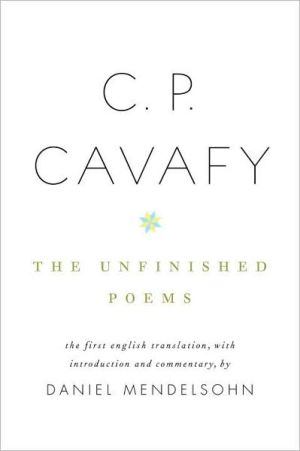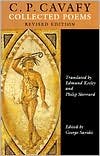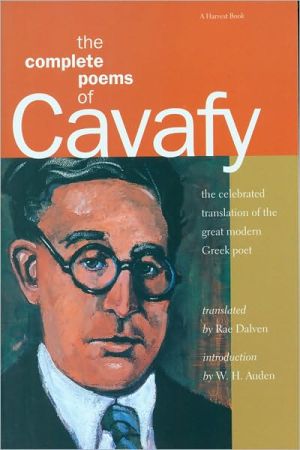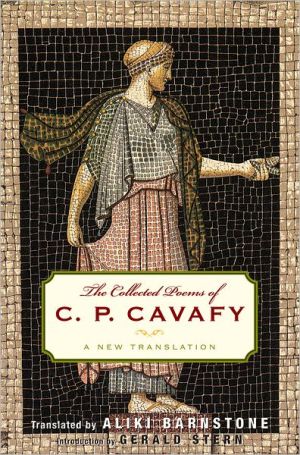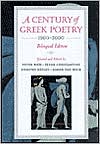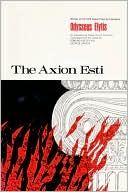C. P. Cavafy: The Unfinished Poems
A remarkable discovery, an extraordinary literary event: the never-before translated Unfinished Poems of the great Alexandrian Greek poet Constantine Cavafy, published for the first time in English alongside a revelatory new rendering of the Collected Poems—translated and annotated by the renowned critic, classicist, and award-winning author of The Lost.\ When he died in 1933 at the age of seventy, C. P. Cavafy left the drafts of thirty poems among his papers—some of them masterly, nearly...
Search in google:
A remarkable discovery, an extraordinary literary event: the never-before translated Unfinished Poems of the great Alexandrian Greek poet Constantine Cavafy, published for the first time in English alongside a revelatory new rendering of the Collected Poems—translated and annotated by the renowned critic, classicist, and award-winning author of The Lost.When he died in 1933 at the age of seventy, C. P. Cavafy left the drafts of thirty poems among his papers—some of them masterly, nearly completed verses, others less finished texts, all accompanied by notes and variants that offer tantalizing glimpses of the poet’s sometimes years-long method of rewriting and revision. These remarkable poems, each meticulously filed in its own dossier by the poet, remained in the Cavafy Archive in Athens for decades before being published in a definitive scholarly edition in Greek in 1994. Now, with the cooperation and support of the Archive, Daniel Mendelsohn brings this hitherto unknown creative outpouring to English readers for the first time.Beautiful works in their own right—from a six-line verse on the “birth of a poem” to a longer work that brilliantly paints the autumn of Byzantium in unexpectedly erotic colors—these unfinished poems provide a thrilling window into Cavafy’s writing process during the last decade of his life, the years of his greatest production. They brilliantly explore, often in new ways, the poet’s well-established themes: identity and time, the agonies of desire and the ironies of history, cultural decline and reappropriation of the past. And, like the CollectedPoems, the Unfinished Poems offers a substantial introduction and notes that provide helpful historical, textual, and literary background for each poem.This splendid translation, together with the Collected Poems, is a cause for celebration—the definitive presentation of Cavafy in English. The New York Times - James Longenbach Auden maintained that Cavafy's tone seems always to "survive translation," and Daniel Mendelsohn's new translations render that tone more pointedly than ever before…It's easy to translate what a poem says; to concoct a verbal mechanism that captures a poem's movement, its manner of saying, requires a combination of skills that very few possess. Like Richard Howard's Baudelaire or Robert Pinsky's Dante, Mendelsohn's Cavafy is itself a work of art.
It Must Have Been the SpiritsIt must have been the spirits that I drank last night,it must have been that I was drowsing, I'd been tired all day long.The black wooden column vanished before me,with the ancient head; and the dining- room door,and the armchair, the red one; and the little settee.In their place came a street in Marseille.And freed now, unabashed, my soulappeared there once again and moved about,with the form of a sensitive, pleasure-bent youth-the dissolute youth: that too must be said.It must have been the spirits that I drank last night,it must have been that I was drowsing, I'd been tired all day long.My soul was released; the poor thing, it'salways constrained by the weight of the years.My soul was released and it showed mea sympathique street in Marseille,with the form of the happy, dissolute youthwho never felt ashamed, not he, certainly. Birth of a PoemOne night when the beautiful light of the moonpoured into my room . . . imagination, takingsomething from life: some very scanty thing-a distant scene, a distant pleasure-brought a vision all its own of flesh,a vision all its own to a sensual bed . . . RemorseTalk about it, this remorse, to soften it-noble to be sure, but dangerously one- sided.Don't cling to the past and torment yourself so much.Don't give so much importance to yourself.The wrong you did was smaller than youimagine; much smaller.The goodness that has brought you this remorse nowwas secreted inside you even then.See how a circumstance that suddenlyreturns home to your memory explainsthe reason for an action that had hardly seemedcommendable to you, but now is justified.Don't count too absolutely on your memory;you've forgotten much-different odds and ends-that would have justified you quite enough.And don't presume you knew the man you wrongedso very well. He surely had virtues you were unaware of;nor perhaps are those deep wounds the onesthat you imagine (out of ignorance of his life)to be the dreadful blows that came from you.Don't count on your feeble memory.Temper your remorse, which is alwaysso one-sidedly against you, it's casuistry.
\ James LongenbachAuden maintained that Cavafy's tone seems always to "survive translation," and Daniel Mendelsohn's new translations render that tone more pointedly than ever before…It's easy to translate what a poem says; to concoct a verbal mechanism that captures a poem's movement, its manner of saying, requires a combination of skills that very few possess. Like Richard Howard's Baudelaire or Robert Pinsky's Dante, Mendelsohn's Cavafy is itself a work of art.\ —The New York Times\ \ \ \ \ Publishers WeeklyIn the last months of his life, Cavafy told a few friends that he had 25 more poems he was working on. This last work, abandoned at various stages of drafting, was mostly lost until it was discovered in the Cavafy Archive, carefully filed and dated by the author, in the 1960s. An authoritative Greek-language edition of Cavafy's unfinished poems-30 in all, written between 1918 and the poet's death-did not appear until the 1990s. Mendelsohn, by special arrangement with the Cavafy Archive, is the first person to be allowed to translate these poems into English, to be published alongside Mendelsohn's Collected Poems of Cavafy (reviewed above). Mendelsohn, in his introduction, says these poems "represent the last and greatest phase of the poet's career" and that they "fully partake of Cavafy's special vision, in which desire and history, time and poetry are alchemized into a unified and deeply meaningful whole." Most of these pieces seem as "finished" as anything in the Collected Poems, though perhaps in full command of a kind of erotic abandon that Cavafy only exposed in the latter part of his writing life: "Ah the ancient Greeks were men of taste,/ to represent the loveliness of youth/ absolutely nude." (Mar.)\ Copyright © Reed Business Information, a division of Reed Elsevier Inc. All rights reserved.\ \
